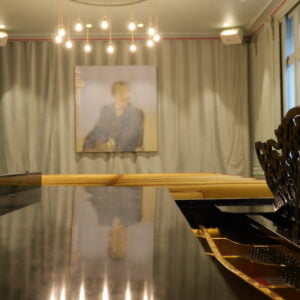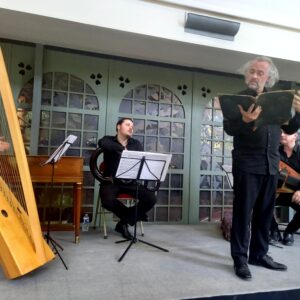Description
Program
Hyacinte Jadin (1776 – 1800)
Quatuor Op.1 n.3 in fa mineur (1795 1ere édition)
I. Allegro Moderato II. Menuet Majeur. III. Polonaise
Luigi Boccherini (1743 – 1805)
Quatuor à cordes op.2 n.6 in Do Maj (1767 1ere édition)
I.Allegro con sprito II. Largo assai III. Tempo di menuetto
Pierre Baillot (1771 – 1842)
Quatuor à cordes op.34 n.1 in si min (1823 première édition ou antérieure)
I. Allegro non troppo. II. Menuetto. A l’Espagnole
Pierre Rode (1774 – 1830)
Deuxieme Quatuor Brillant Op. Posth.2 en Do Majeur
I. Andantino II. Rondo
Giovanni Battista Viotti (1755 – 1824)
Quatuor en Sol – mineur (année de composition antérieure à 1791)
I. Piu tosto Lento, II. Allegretto
Quartets by Boccherini, Viotti, Rode, Kreutzer, Jadin
"I have just sent to the ambassador of the Republic the piece that I had written and dedicated to the French nation as a testimony of the deep appreciation and gratitude that I feel towards it. The nation which had most appreciated and honored my poor compositions... "*.
Boccherini dedicated some of his works to the French Nation and Republic and to his last patron Lucien Bonaparte. In the newspaper La Décade philosophique, littéraire et politique (September 15, 1798), one can read that the young Parisian bourgeois listened to Boccherini's "celestial" music at the home of Giovanni Battista Viotti, who had just returned from London to Paris and was very upset by the end of the concert.
Boccherini, Viotti, Jadin and Rode or Kreutzer: each of these eminent composers and performers had a very personal style that was sought after and coexisted harmoniously in the Parisian life of the late 18th century. One could discover a radiant, mysterious, inventive and playful Boccherini alongside a melancholic, fragile and sensual Jadin. Meanwhile, Rode's brilliance, bravura and virtuosity were influenced by the serene, melodic and sometimes nostalgic Viotti - all this variety of sound palette could be experienced simultaneously in Paris and even in the same time of a concert.
Very often these composers and their style are not considered "serious" or important compared to their contemporaries such as Mozart, Haydn or Beethoven. However, upon closer inspection and examination from a different angle, we discover very authentic and dedicated personalities, full of poetry.
"...I worked almost five months to accomplish this easy piece so that many can enjoy it. I'm not sure I did anything right, but I'm sure the music is meant to speak to the human heart, and that's something I try to achieve if it's in my power. Music that lacks feeling and passion is meaningless. Therefore, the composer cannot do anything without the performer. It is very important that there is a closeness between them and the author; they must feel inside everything he has written, unite, rehearse, inquire and finally study the intention of the composer in order to perform the piece. In this way, they almost manage to steal the composer's applause, or at least share the glory with him. If the reward is hearing 'oh, what a beautiful piece,' I find it would make more sense to add 'oh, how angelically performed.'"
Vadym Makarenko
*The two quotations in the text are taken from Boccherini's letter
dated July 8, 1799 (Madrid) and addressed to Marie-Joseph Chénier.
Infermi d’Amore is a dynamic early music ensemble composed of accomplished musicians from Spain, the United States, Canada, Ukraine, Italy and France. United by their passion for the arts during their studies at the Schola Cantorum Basiliensis in Basel, Switzerland, they focus on the performance of 17th and 18th century instrumental music, ranging from early baroque to late classical repertoire.
The Infermi d'Amore take their name and philosophy from the musical institutions, orphanages and "ospedales" that flourished mainly in Venice and Naples in the 17th and 18th centuries, where music was a central activity of its members. The group also takes its name from the collection of cantatas Il pazzo con la pazza ristampata e Uno ospedale per gl’Infermi d’amore (Naples, d.1620), by the Neapolitan composer Pietro Antonio Giramo, which deals with the different modes of madness that can result from love.
Motivated by the philosophy and aesthetics of Baroque and Classical music, these young performers strive to find common ground with our current times and with all types of audiences. From their perspective, music is a universal language that cannot be translated but rather experienced. The members of Infermi d'Amore want their concerts to be not only musical events, but also a place where everyone is welcome: a free space where one can share the most sincere feelings and the most generous emotions evoked by music.




Reviews
There are no reviews yet.